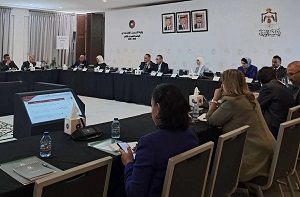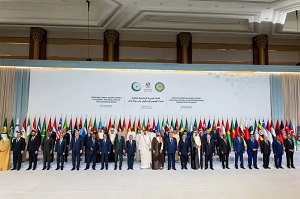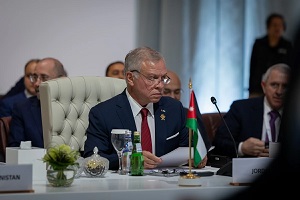Industrial sector outlines main initiatives under EMV

AFP
AMMAN — The Industrial sectorialsession was held on Monday as part of the preparations for the second executive programme of the Economic Modernisation Vision (EMV) 2026–2029, at the Prime Ministry on Monday.
The session came under the High-Value Industries engine of the EMV and brought together policymakers, experts, and industry leaders to outline actionable steps for strengthening the national industrialbase.
Minister of Industry, Trade and Supply Yarub Qudah opened the session, stressingthe industrial sector's strategic role as a key engine for economic growth, job creation, particularly for youth, and enhancing the global competitiveness of Jordan’s economy.
Qudah said the session aimed to build on the achievements of the first phase of the EMV by outlining a set of clear priorities.
These include upgrading industrial infrastructure, streamlining and automating procedures, and offering incentives to boost the competitiveness of Jordanian products at regional and international levels.
He added that "special" attention was given to improving the business environment for small and medium-sized enterprises (SMEs), offering "rapid"solutions to operational challenges, and reviewing "regulatory" procedures whichmay hinder growth.
The minister stressed the importance of aligning national industrial efforts with global trends. He warned that failure to keep pace with technological and market developments would make it increasingly difficult for local firms to remain competitive.
Instead, he called for "stronger"collaboration across public and private sectors, institutional reform, and innovation-driven solutions as the foundation for advancing the national industrial strategy.
Qudah also referred to the Royal Court-led workshops held earlier this year, which enabled open dialogue between the government, industry stakeholders and experts.
He added that the outcomes have shaped a "forward-looking" agenda focused on investment stimulation, supply chain development and expansion into new markets.
Among the flagship initiatives discussed during the session was the launch of the Facilitated Manufacturing programme, which aims to simplify and automate industrial procedures.
The programme proposes establishing a "specialised" regulatory body to oversee and streamline all industrial approvals and compliance requirements.
Another initiative, the SME leadership initiative, focuses on supporting the sustainability and growth of SMEs.
This includes developing new business models, promoting industrial entrepreneurship, enabling access to new technologies and opening up new market opportunities.
Participants also reviewed plans for a new national industrial policy aimed at fostering a competitive and diversified industrial ecosystem.
The regulations will focus on building "high-value" production chains, increasing export capacity, and generating "sustainable" employment through innovation, productivity and a "broader"export portfolio.
The session outlined a specific strategy for export diversification, with the goal of increasing the reach of Jordanian products in global markets.
This includes designing targeted export plans, signing new trade agreements, enhancing quality standards, and integrating local industries into global value chains.
Another core objective is to deepen local production capabilities, reduce reliance on imports, and position the industrial sector as a primary driver of job creation; enhancing productivity, reducing costs and supporting workforce development, especially among youth and women, were also identified as "strategic" priorities.
The sector aims to foster a national culture of innovation and research by supporting industrial R&D, building sector-specific innovation hubs, and ensuring that SMEs are integrated into "larger" industrial value chains.
The minister also pointed to recent achievements, noting that the industrial sector contributed approximately JD6.094 billion to Jordan’s GDP in 2024.
On the sub-sectoral level, the session discussed establishing an "integrated"national strategy for the chemical industry, stimulating investment in pharmaceuticals, and enhancing food industry efficiency through better inspection systems and skills development.
During the session, the efforts to advance the engineering industries were highlighted, including adopting industrial technologies, accelerating digital transformation and launching a national strategy for the development of the sector.
The session concluded with a call for continued collaboration to translate these initiatives into "tangible" results that would elevate Jordan's industrial standing, both regionally and globally.
Latest News
-
 Israel launches ground assault on Gaza City
Israel launches ground assault on Gaza City
-
 Qatari emir to arrive in Amman Wednesday for talks with King Abdullah
Qatari emir to arrive in Amman Wednesday for talks with King Abdullah
-
 ‘Gaza is burning,’ Katz says after night of intensive 'Israeli' bombardment
‘Gaza is burning,’ Katz says after night of intensive 'Israeli' bombardment
-
 Arab-Islamic Summit issues final statement, condemns Israeli attack on Qatar, calls for accountability
Arab-Islamic Summit issues final statement, condemns Israeli attack on Qatar, calls for accountability
-
 King delivers Jordan's address at Emergency Arab-Islamic Summit in Doha
King delivers Jordan's address at Emergency Arab-Islamic Summit in Doha